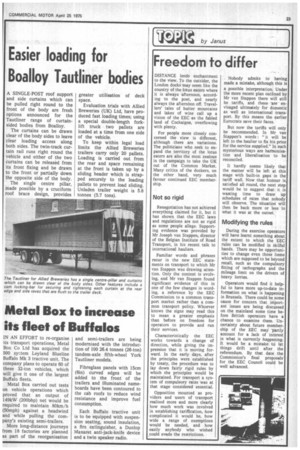Freedom to differ
Page 25

If you've noticed an error in this article please click here to report it so we can fix it.
DISTANCE lends enchantment to the view. To the outsider, the London docks may seem like the country of the Icitus eaters where it is always afternoon, according to the poet, and nearly always the afternbon off. Travellers' tales of butter mountains and lakes of wine call up a vision of the EEC as the fabled land of Cockaigne, overflowing With plenty.
For people more closely concerned the view is different, although there are variations. The politicians who seek to expand the territory of the lotus eaters are also the most zealous in the campaign to take the UK out of the Common Market. Many critics of the dockers, on the other hand, very much favour continued EEC membership.
Not so rigid
Renegotiation has not achieved everything claimed for it, but it has shown that the EEC laws and regulations are not as rigid as some people allege. Supporting evidence was provided by Mr Joseph van Stappen, director of the Belgian Institute of Road Transport, in his recent talk to international hauliers.
Familiar words and phrases recur in the new EEC statements on transport to which Mr van Stappen was drawing attention. Only the context is evolving, and Mr van Stappen found significant evidence of this in one of the few changes in wording, a reference by the EEC Commission to a common transport market rather than a common transport policy. Whoever knows the signs may read this to mean a greater emphasis than before on freedom for operators to provide and run their services.
Characteristically the EEC works towards a change of direction, while giving the impression that it is moving forward. In the early days, after the principles were established by treaty, the procedure was to lay down fairly rigid rules by which 'the principles would be maintained. For transport a system of compulsory rates was at that stage considered essential.
Opposition mounted as providers and users of transport realised more and more clearly how much work was involved in establishing tariffication, how complicated it would be, how wide a range of exemptions would be needed, and how easily anybody who wished could evade the restrictions. Nobody admits to having made a mistake, although this is a possible interpretation. Under the more recent plan outlined by Mr van Stappen there will still be tariffs, and these are envisaged ultimately for domestic as well as international transport. By this means the earlier Eurocrats save their faces.
But now the tariffs will only be recommended. In Mr van Stappen's words : " it will be left to the haulier to fix his price for the service supplied," In such mysterious ways are harmonisation and liberalisation to be reconciled.
It hardly seems likely that the matter will be left at this stage with built-in gaps in the tariff wall. Now that honour is satisfied all round, the next step would be to suggest that it is wasting time to draw up schedules of rates that nobody will observe. The situation will then be back more or less to what it was at the outset.
Modifying the rules
During the exercise operators will have learnt something about the extent to which the EEC rules can be modified in skilful hands. There may be opportunities to change even :hose items which are supposed to be beyond recall, such as the compulsory fitting of tachographs and the mileage limit on the drivers of heavy lorries.
Operators would find it helpful to have more up-to-date information on what is happening in Brussels. There could be some cause for concern that important issues are being discussed on the mainland some time before British operators have a chance to examine them. Uncertainty about future membership of the EEC may partly account for a lack of interest in what is currently happening. It would be a mistake to let things drift until after the referendum. By that date the Commission's final proposals' for the EEC Council could be well advanced.




















































































